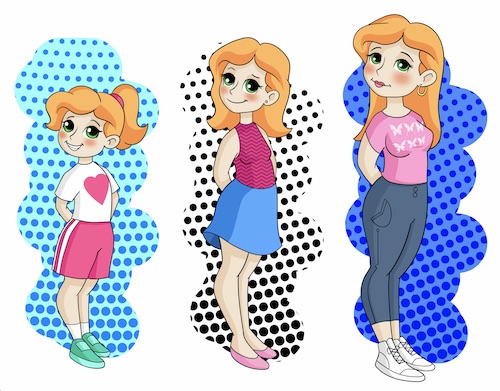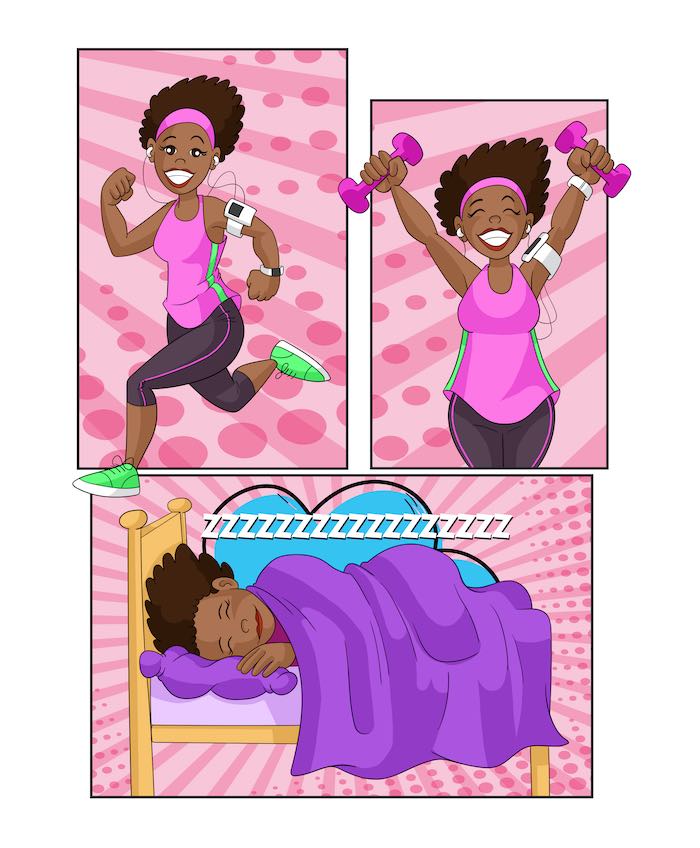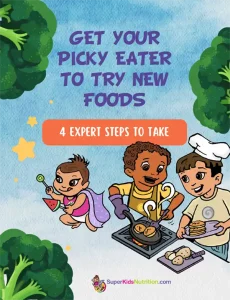
I caught up with Registered Dietitian Maryann Jacobsen to learn more about her new book, My Body’s Superpowers.
This Q&A with Maryann provides valuable insight into the conversations you should be having with your tween who’s going through puberty and ways you can help her have a healthy experience. Let’s take a closer look at My Body’s Superpower*.
This post contains affiliate links. As an Amazon Associate, we earn from qualifying purchases. The links are noted with an asterisk (*) or Amazon image.
1) Why should parents be aware of “body talk” around their tweens?
Girls enter puberty around 10-11 but as early as 8 years old. Their bodies change and they gain weight, much of which is fat. Girls respond to these changes in a variety of ways. We know that half of the population of girls don’t like how their bodies are changing. We also know that a negative body image is likely to stick around, so it’s important that parents address it while the changes are occurring. When parents hear their daughters talk about their body or someone else’s, that’s a good time to address puberty and body changes.
Parents also need to be careful not to engage in negative body talk about themselves, their child, or anyone else. This sends strong messages to girls and research shows they can become more critical of their own bodies as a result. Girls with a poor body image are less likely to engage in healthy habits and more likely to diet and binge eat.

2) How does the media influence children and tweens? What is a step parents can take from your book to combat that?
Research shows that media has a strong influence on how a girl sees herself and her body. For instance, girls who frequently engage with social media are more likely to be dissatisfied with their bodies. Most models are underweight or severely underweight. Girls are being sent these messages all the time and the problems occur when they internalize them, making them their own. What we want to do is help them critically think about these messages so that when they see them they can think: “This is not how most girls/women are, it’s just the appearance ideal in the media.”
In my book, My Body’s Superpower: The Girls’ Guide to Growing Up Healthy During Puberty*, there’s a chapter focused on a girl’s critical thinking superpower. She learns the difference between the Real World and the Virtual World. The Virtual World is manmade and not at all reflective of the Real World. For instance, on social media, people only post their best moments and not the times they feel lonely or insecure (which everyone does). In this chapter, girls learn to ask important questions challenging the Virtual World. There’s a journal that goes with the book so they can practice this skill.
3) What are a couple of things a parent can do to help both parent and child understand early adolescence and how does your book help?
Early adolescence starts around 10 and it is a confusing time not just for kids, but for the parents of a preteen or teen. The mind and body start changing in early adolescence. This can be hard because the things that kids used to enjoy can become boring, but they aren’t sure what they want to do. This is when a bad attitude can show up. Parents become frustrated, making that known to their adolescent. A disconnection between parent and child can result. Understanding that these changes are normal can help both parents and adolescents.
- In the Super You chapter of my book I explain how this is a time adolescents develop their own identity, which doesn’t happen overnight. Parents can help their kids in this area by understanding their ambivalence and supporting them in trying new activities. Parents can also help kids understand their new, intense feelings.
- In the Internal Compass chapter, girls learn what different feelings are trying to tell them and how they can use them to make good decisions and problem solve.
This understanding turns a trying time into a time of opportunity and growth. Unfortunately, without this knowledge, parents and kids can grow further apart and adolescents may not develop a strong sense of self. We need to remember that kids can’t have growth without discomfort.
4) You mention body signals. Can you explain why these are so important to understand?

In the book, I refer to it is Physical Powers. The messages the body sends are important and help a girl learn how to respond. In the research, this is referred to as interoceptive awareness. This helps in a variety of ways. Listening and responding to the body’s superpower of Appetite Signals helps girls get the right amount of food for their body type. Noticing how sleep and physical activity give her Super Focus helps her aim for this because it feels good.
Understanding different foods and combinations of foods help her body with Super Functioning. Listening and honoring your body is the best way to engage in healthy habits. If girls can learn this as they experience these changes, it is more likely they will stick for a lifetime. My book goes over all of these body signals (referred to as Body Talk). It also includes body signals of emotions which is just as important.
5) How can parents talk about weight concerns with their child?
The focus should always be on health, not weight. It is likely that weight issues (either growing too fast or too slow) have to do with dysregulated eating. This means tackling factors like sleep, activity, emotional health (such as stress), balanced meals, eating at the table, and listening to hunger and fullness.
What parents do need to talk about with their kids is how the body changes during puberty and natural weight gain. Most parents and girls don’t understand that they gain fat in preparation for their menstrual cycle. Parents can be empathic to their child’s concerns about weight while helping her learn how to accept and take care of her body. Though, parents should never make weight the focus of healthy habits. Research is pretty clear this backfires and is demotivating.
If you have a girl who is going through puberty right now or want to prepare yourself for when the time comes, get your own copy of My Body’s Superpowers today!
Check out the other books in our Parent’s Book Corner that you can use as guidance to help your children stay healthy.












